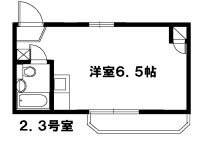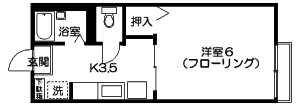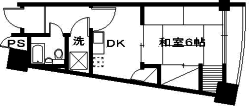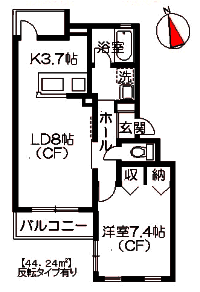日本的出租屋大多有一定的規格及配置,也有常用的業界術語。
看不懂什麼是1DK、分不清楚什麼是1K、1R 嗎? 別擔心,請來看看這篇文章。
|
1.日本の公寓 Apartments in Japan
|
|
(1)建築物的種類
Types of apartment buildings
|
|
在日本,出租屋的建築物大致上可分為三種。
There are 3 types of apartment buildings in
Japan.
|
種類(Type)
|
内容(Details)
|
|
アパート(Apart/Apartment)
|
木造或輕量鐵骨造的建築物。主要為2層樓以下。有時會容易聽到隔壁的聲音。
This type of building is made of wood, or
light steel. It is usually only two stories or less. Walls are thin, and
you can usually hear noise from neighbors' homes.
|
|
マンション(Mansion)
|
3層樓以上的建築物、鐵骨・鋼筋水泥造。房租較Apart高。
This type of building tends to have three or more stories, and be made of a
steel framework and reinforced concrete. Rent is typically higher than the
'apato'.
|
|
貸家(Kashiya)
|
獨棟。日文也稱為IKKODATE。指整家房子出租的物件。
This type of apartment building is also
called 'ikkodate', and is a house on a lease or loan.
|
|
|
(2)隔間的種類 About
different floor plans
|
|
日本有其特有的隔間表示方法,主要如下述。
Some typical Japanese style floor plans are
outlined below..
各圖面為參考例。Please
see the following examples.
|
表現方法
|
内 容
|
|
1ROOM
|
|
臥室空間與廚房相連的型式。浴室、廁所一般都不分離。房間大小多為16m2至20m2。
This type of apartment usually has a
bedroom/kitchen combination, and a bath/toilet combination room. The
average size is 16m2~20m2.
|

|
|
|
1K
|
|
臥室空間與廚房有隔開的型式。房間大小幾乎與1ROOM相同。
Although the size of the apartment is
almost identical to a 1ROOM, in a 1K the bedroom and kitchen are
seperated..
|

|
|
|
1DK
|
|
有臥室與餐廚空間的型式。房間大小會比1ROOM、1K稍大。
A 1DK has a bedroom, and a kitchen/dining room combination. The overall
size is slightly larger than a 1ROOM or 1K.
|

|
|
|
1LDK
|
|
臥室與起居室(客廳)分開的型式。房間大小主要以40㎡至60㎡為主流。
A 1LDK has a seperated bedroom and
living room. The common size of an apartment of this type is 40m2~60m2.
|

|
|
|
1SLDK
|
1SLDK為附有(大至人可走進去的)收納室的房間。A 1SLDK is almost identical to a 1LDK room, except that is has
a large walk-in size closet.
|
|
數字為房間的數量、K為廚房、D為餐廚區、L為客廳(起居室),S為儲藏收納室(STORAGE)。依各種組合即可表現出房間的隔間型式。例如: 2SDK、3LK等。
In names of the rooms listed above, the number reperesents the number of
rooms in the apartment. .K means kitchen. D
is dining room, L is living room, and S is storage. Floor plans are
described with different combinations of these. For example, 2SDK is a two
room apartment with dining, kitchen, and large closet space.
|
|
|
3.室内地板的種類
Types of flooring
|
|
日本有好幾種的地板。Japanese apartments may have one of several types of flooring:
|
種 類
|
内 容
|
|
畳 Tatami
|
塌塌米,在柔道中常被使用,屬於典型的日式房間。使用「燈心草」纖維所編製而成。燈心草的香味具有鎮靜效果,可以讓人感到平靜。同時也具有防音性。If you are familiar with Judo, you may have heard of 'tatami'.
It is the traditional type of flooring used in Japan, and is a kinitted mat
made of a plant called Igusa (rush). Igusa is said to have a gentle calming
scent, so tatami rooms are ideal for relaxing in. As an added benifit,
tatami is soundproof!
|
|
フローリング Flooring
|
木質地板。由木板所構成的地板。外觀雖然漂亮整潔,但容易刮傷,且不太具有防音效果。'Flooring' is made of wooden board. Although is tends to look
neat, it scratches easily, and it not soundproof.
|
|
クッションフロアCushioned floor
|
緩衝地板。因為表面被覆著一層塑膠,所以不耐火,但耐水性優越。表面柔軟,用指甲即會造成刮傷。Cushioned floor is floorboard covered in a type of plastic. Since it is
rather soft, it doesn't hold up well in the event of a fire. On the plus
side, it's waterproof.
|
|
じゅうたん Carpet
|
地毯。防音效果高且觸感佳,但日本濕度高,可能要擔心跳蚤的問題。而且很容易弄髒,所以租屋物件通常不會使用地毯。Carpeting is effectively soundproof and, of course, very
comfortable. On the down side, since Japan is so humid, carpet owners need
to be wary of ticks and other bugs breeding in their flooring. Carpet is
also very hard to keep clean. These two reasons are why rental rooms with
carpeting are so rarely found in Japan.
|
|
|
4.房間面積的單位
Apartment measurments
|
|
日本一般常使用的房間面積単位有3種。
There are generally 3 measuring units used to measure apartments in Japan.
|
單 位
|
内 容
|
|
平方メートル(m2)
|
平方公尺。 Square meter
|
|
坪(TSUBO)
|
1坪=約3.3m2, 2畳 1 tsubo=about 3.3m2 or 2 jo
|
|
畳(JYOU)
|
1畳=約1.65m2、0.5坪 1
JO=about 1.65m2、0.5 tsubo
|
|
|
最近,大家又開始重新認識塌塌米的好處了
Singing the praises of TATAMI!
|
|
日本的房間,主要有古早以來的塌塌米房間、與木質地板房間。但因為現在大部分年輕人的生活習慣西化,所以有較偏好木質地板的傾向,而塌塌米房間也因此而逐漸減少。
In Japan, the most popular types of flooring have always been wood 'flooring'
and tatami mat. As Japan is becoming more modernized (and in becoming so,
more Westernized) more and more people are begining to choose wood flooring
over the traditional tatami. Therefore, the numbers of tatami rooms are
dwindling away.
然而,另一方面,大家又開始重新體認到塌塌米的好處。塌塌米不但具有隔熱效果,而且冬暖夏涼,一整年都能讓人感到很舒適。
But recently, there has been alot of talk about the benifits of tatami
flooring! For one, since Tatami insulates heat, a tatami floored room is
cooler in the summer and warmer in the winter.
此外,塌塌米比地毯容易清掃,可保持乾淨,防音效果又較木質地板好。而且,塌塌米的房間裡,只要舖了被子就變寢室,放了桌子就變餐廳或客廳,一個房間就能有各式各樣的用途。
Moreover, tatami mats are easier to clean and far more sanitary than carpet.
They are more effectively sound proof than wooden flooring. A Tatami room is
very versatile, and can be used as many rooms in one. For example, you can
use the room as both bedroom (when you lay out your futon) and dining and
living room (when you fold up your futon and set out a table).
因此,在不使用冷暖氣器具的房間、牆壁或地板較薄的房間、房間數較少的物件,還是塌塌米最適用。即然難得來到日本生活了,各位要不要也來體驗看看塌塌米房間呢?
So if you have a small apartment without
much space, if you have thin walls, or if you have no air conditioner, tatami
may be the best choice for you. To get the full experience of living in a
Japanese apartment, leave those wooden floors and carpets behind, and do as
the Japanese do. Go tatami!
|
資料來源: J & F Network






 留言列表
留言列表

